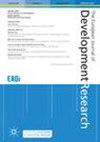运用全身反应进行小学生词汇教学
IF 2.6
3区 社会学
Q2 DEVELOPMENT STUDIES
引用次数: 2
摘要
词汇是英语学习者学习的重要语言组成部分。应该从小开始教,尤其是小学生。英语词汇教学,尤其是对小学生的英语词汇教学,需要有效、有趣、适合儿童学习特点的教学方法。孩子们通过他们的所见、所听和所做来理解事物。因此,英语教师应该选择适合孩子的方法。教词汇的方法之一是通过全身反应(TPR)法。本研究采用描述性质的研究方法,对小学实施TPR词汇教学过程中的教材、教师角色、教学阶段进行描述。本研究的对象为小学英语教师。数据来源于教学过程中的观察、对被试的访谈和文献分析。结果表明,教师使用的教材与学生的日常生活相适应,具有一定的相关性。教师有几个角色,即作为策划者、指导者、模范和评估者。词汇教学分为教学前阶段、教学中阶段和教学后阶段。老师运用了唱歌、听和做、游戏和对话等多种多样的课堂活动。最后,老师进行了一个测试来衡量学生的理解能力。本文章由计算机程序翻译,如有差异,请以英文原文为准。
Teaching Vocabulary through Total Physical Response to Elementary Students
Vocabulary is an important language component to be learned by English language learners. It should be taught since early age, especially to elementary students. Teaching English vocabulary, especially to elementary students, required effective and interesting method that suits with children’s learning characteristics. Children understand something through what they see, listen, and do. Therefore, English teachers should select the suitable method that is child-friendly. One of the ways to teach vocabulary is through Total Physical Response (TPR) method. This study was descriptive qualitative research to describe teaching material, teacher’s roles and teaching stage in the implementation of TPR to teach vocabulary to elementary students The subject of this study was the English teacher who taught the elementary students. The data were obtained from observation during the teaching and learning process, interview to the subjects and document analysis. The findings revealed that the teaching material used by the teacher was correlated and suited with the students’ daily life. The teacher has several roles, namely as a planner, a director, a model, and an assessor. The stages of teaching vocabulary were pre-teaching, whilst-teaching and post-teaching. The teacher used varied classroom activities such as singing, listen and do, game and dialog. In the end, the teacher conducted a test to measure the students’ comprehension.
求助全文
通过发布文献求助,成功后即可免费获取论文全文。
去求助
来源期刊

European Journal of Development Research
DEVELOPMENT STUDIES-
CiteScore
5.70
自引率
4.00%
发文量
77
期刊介绍:
The European Journal of Development Research (EJDR) redefines and modernises what international development is, recognising the many schools of thought on what human development constitutes. It encourages debate between competing approaches to understanding global development and international social development. The journal is multidisciplinary and welcomes papers that are rooted in any mixture of fields including (but not limited to): development studies, international studies, social policy, sociology, politics, economics, anthropology, education, sustainability, business and management. EJDR explicitly links with development studies, being hosted by European Association of Development Institutes (EADI) and its various initiatives.
As a double-blind peer-reviewed academic journal, we particularly welcome submissions that improve our conceptual understanding of international development processes, or submissions that propose policy and developmental tools by analysing empirical evidence, whether qualitative, quantitative, mixed methods or anecdotal (data use in the journal ranges broadly from narratives and transcripts, through ethnographic and mixed data, to quantitative and survey data). The research methods used in the journal''s articles make explicit the importance of empirical data and the critical interpretation of findings. Authors can use a mixture of theory and data analysis to expand the possibilities for global development.
Submissions must be well-grounded in theory and must also indicate how their findings are relevant to development practitioners in the field and/or policy makers. The journal encourages papers which embody the highest quality standards, and which use an innovative approach. We urge authors who contemplate submitting their work to the EJDR to respond to research already published in this journal, as well as complementary journals and books. We take special efforts to include global voices, and notably voices from the global South. Queries about potential submissions to EJDR can be directed to the Editors.
EJDR understands development to be an ongoing process that affects all communities, societies, states and regions: We therefore do not have a geographical bias, but wherever possible prospective authors should seek to highlight how their study has relevance to researchers and practitioners studying development in different environments. Although many of the papers we publish examine the challenges for developing countries, we recognize that there are important lessons to be derived from the experiences of regions in the developed world.
The EJDR is print-published 6 times a year, in a mix of regular and special theme issues; accepted papers are published on an ongoing basis online. We accept submissions in English and French.
 求助内容:
求助内容: 应助结果提醒方式:
应助结果提醒方式:


